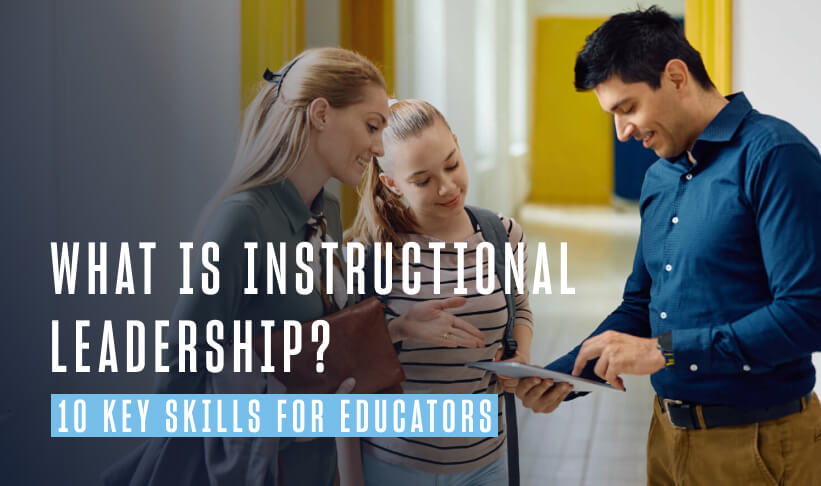Educational leaders play a pivotal role in affecting the climate, attitude and reputation of their schools. They are the cornerstone on which learning communities function and grow. With successful school leadership, schools become effective incubators of learning, places where students are not only educated but challenged, nurtured and encouraged.
On the other hand, poor or absent school leadership can undermine the goals of an educational system. When schools lack a strong foundation and direction, learning is compromised and students suffer. According to a Wallace Foundation study, “Indeed, leadership is second only to classroom instruction among school-related factors that affect student learning in schools.”
The Makings of a Successful School Leader
But what makes a successful school leader? How do you become truly effective as a principal or in a leadership position? While there is no one solution to successful school leadership, there are certain strategies, skills, traits and beliefs that many of the most effective school leaders share.
[RELATED] How to Advance Your Career: A Guide for Educators >>
The majority of effective school leaders believe in the importance of:
Building Community

Megan Tschannen-Moran, author and professor of educational leadership at the College of William and Mary, discusses the importance that trust plays in building communities in her book, Trust Matters: Leadership for Successful Schools. Tschannen Moran explains,
“In schools with high levels of trust:
- Teachers are motivated and willing to try new strategies because they trust leaders to support them.
- Students are motivated and connected to the school because they trust their teachers.
- Families are supportive because the principal and teachers have built trusting relationships with them.”
Supporting Teachers and Cultivating Leadership
Great school leaders know that they are not running a one-man show; that they can not do it all alone. They know that they must surround themselves with great teachers and colleagues and not only that, but they must fully support teachers and staff by encouraging them to continually learn, develop and perhaps most importantly, become leaders themselves.
It is no secret that when people are fulfilled and given opportunity for career growth as well as autonomy and control over their careers, they are more productive, more engaged and overall more effective. In a recent Gallup poll it was discovered that 31% of U.S. teachers are engaged in their work, while 56% are not engaged and 13% are actively disengaged. These statistics are startling to say the least.
Through offering professional development opportunities and support services to teachers as well as by creating an environment where teachers are able to experiment, innovate and lead, principals can ensure a healthy environment for educators that will have positive repercussions for students. According to another Gallup study, it was “found that highly talented principals on Gallup’s Principal Insight assessment were 2.6 times more likely to have above average employee engagement at the schools they lead three years later.”
In his book, What Great Principals Do Differently, Todd Whitaker wrote,
“Great principals focus on improving the quality of the teachers within their buildings. By carefully hiring the best teachers, by supporting their efforts and their ambitions, by holding all staff members to high expectations, and by working to carefully support the individual development of each professional, principals impact student achievement.”
Utilizing Data and Resources

One example of how data can reveal surprising results and help better learning was discussed in an ASCD article,
“Staff members at Canyon View High School wanted to use their data to understand why more than half of the school’s 9th grade students failed the state reading proficiency examination. Working backward through the students’ education experiences to determine the earliest occurrence of a characteristic common to all students who had not passed the exam, the teachers were shocked to see that most of these students had missed up to 30 or 40 days in a 180-day school year when they were 1st graders.”
And according to the Wallace Foundation,
“When it comes to data, effective principals try to draw the most from statistics and evidence, having ‘learned to ask useful questions” of the information, to display it in ways that tell “compelling stories” and to use it to promote “collaborative inquiry among teachers.’ They view data as a means not only to pinpoint problems but to understand their nature and causes.”
Beyond these four tenants, successful school leaders:
- Have a vision and a plan.
- Set high expectations for everyone, that includes teachers, students, staff and themselves.
- Create learning environments that are collaborative and accepting of everyone.
- Constantly find ways to improve instruction.
- Stay with a school for five years or more. The long game has been proven extremely important in successful school leadership.
- Have a passion for what they do—for improving learning and elevating students.
- Inspire others to reach higher and work harder.
“Leadership and Learning are Indispensable to Each Other” —John F. Kennedy
Yet, perhaps the most important of all qualities that a school leader can posses is the unquenchable thirst for knowledge. As John F. Kennedy said, “leadership and learning are indispensable to each other.” The best leaders, no matter what industry they work in, know they will never know it all. They are humble in their knowledge yet confident in their abilities. They’re endlessly curious individuals who never stop questioning, and learning. The Harvard Business Review put it perfectly when they said,
“It takes a real sense of personal commitment, especially after you’ve arrived at a position of power and responsibility, to push yourself to grow and challenge conventional wisdom. Which is why two of the most important questions leaders face are as simple as they are profound: Are you learning, as an organization and as an individual, as fast as the world is changing? Are you as determined to stay interested as to be interesting? Remember, it’s what you learn after you know it all that counts.
The best leaders I’ve gotten to know aren’t just the boldest thinkers; they are the most insatiable learners.”
It is hard to think of an industry where constant learning is more applicable than in the education industry itself.
To be a successful and effective leader is no easy feat. Yet, effective school leaders are desperately needed in thousands of schools and educational institutions across this country and world today. As Kenneth Leithwood stated in a Hechinger Report, “Indeed, there are virtually no documented instances of troubled schools being turned around without intervention by a powerful leader.”
At the University of San Diego we offer a 100% online Master of Education degree with a specialization in School Leadership. To learn more about our nationally accredited program visit our program page.





